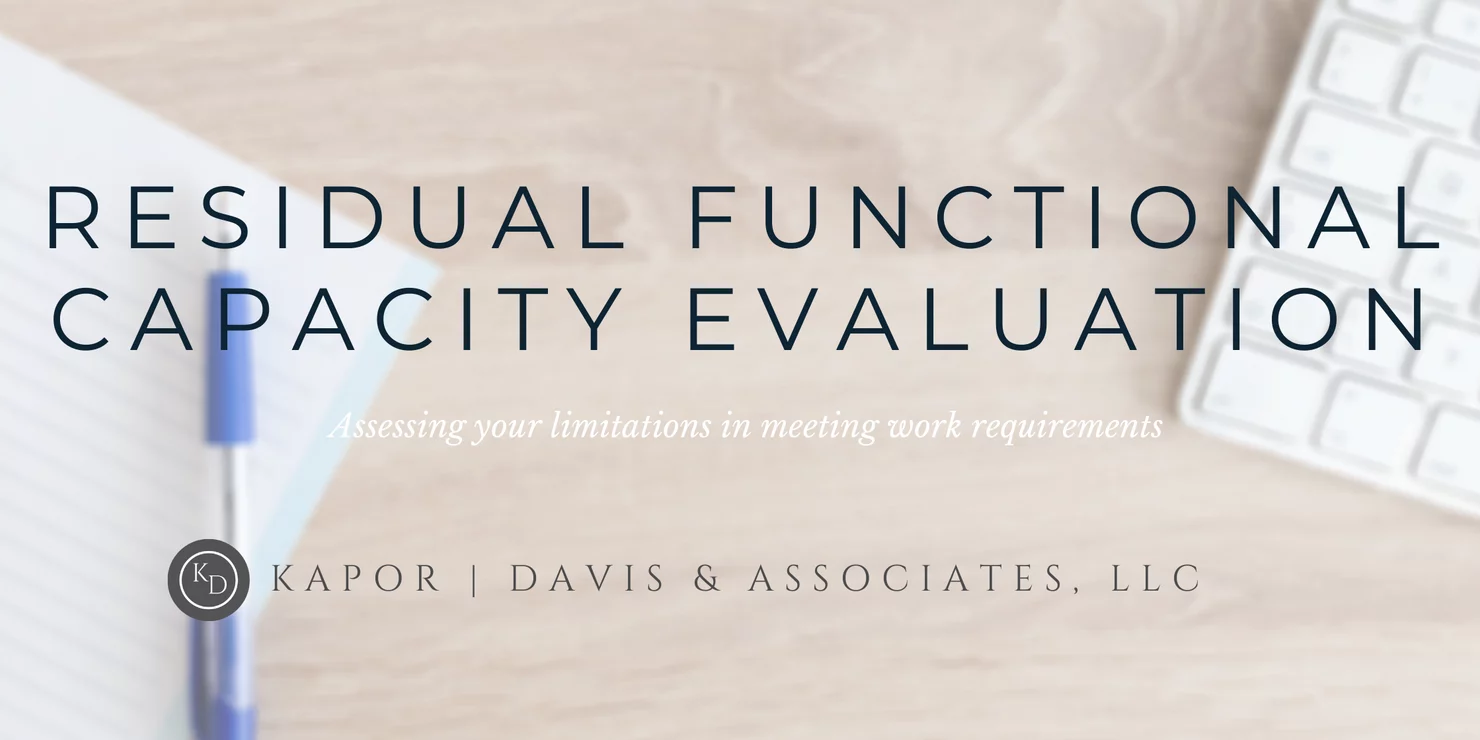Residual Functional Capacity Evaluation
June 29, 2022

Understanding Residual Functional Capacity
If you recall from our blog last month, we discussed Social Security’s 5-Step Sequential Evaluation. In Step 4 of that evaluation, the Social Security Administration and Disability Determination Services perform a Residual Functional Capacity Evaluation. This post will explain what this evaluation is and how it affects your claim.
The purpose of residual functional capacity evaluations is to identify how your impairments and their symptoms prevent you from performing work-related tasks. After Social Security considers your disabilities, this evaluation is supposed to demonstrate what you are still able to do.
A medical consultant with Disability Determination Services (DDS) will assess your Residual Functional Capacity. There are different elements to an RFC Evaluation: your age, education, mental limitations, physical limitations, postural and environmental limitations, and a vocational analysis, which assesses your past relevant work and what tasks you were able to perform at that job.
Age:
Age is one of the first aspects assessed by the DDS. Typically, the younger a person is, the more likely they are to be able to learn new skills and adjust to different work. The older a person is, the more likely it is that they will not be able to learn new skills or adjust to different types of work. This means that younger individuals can have a harder time proving they are completely disabled.
Education:
Typically, the Social Security Administration doesn’t consider much about education if an applicant has finished 12th grade (or received a GED). Education becomes more prominent in your RFC if:
- You have not finished high school
- Took special education classes or had an IEP
- You are illiterate
- You are unable to speak/communicate in English
Other educational factors that are considered are how far you got in school, whether you had on the job training or training in a trade, and how long ago you completed your education. Your past education will indicate your ability to adapt to different kinds of work or learn new skills.
Exertional RFC:
Your physical limitations are evaluated as your exertional capacity. They want to know if you can perform common work tasks at a level where you earn a livable income. Common work tasks that are assessed are as follows:
- How long can you sit and/or stand in an 8-hour workday?
- How far can you walk?
- How much weight can you…
- Lift?
- Carry?
- Push?
- Pull?
Based on your ability to perform each of these tasks to a certain degree, you will be assigned to a level. The physical exertional levels are:
- Sedentary
- Light
- Medium
- Heavy
- Very Heavy
Lower exertional capacities limit the amount of work-related tasks one would be capable of. You would therefore be less likely to be able to engage in gainful employment or work due to your impairments, which would increase the likelihood of being found disabled by the SSA.
Non-Exertional RFC:
Your mental RFC is assessing your non-exertional limitations, which are related to mental health, fine motor skills, postural limitations, and environmental limitations. While some of these limitations will not prevent you from physically being able to perform work, they can create difficulty in dealing with non-physical stresses in the workplace.
Non-exertional limitations can be caused by symptoms such as pain or be caused by mental health illnesses. If you have non-exertional limitations related to mental illness, the SSA will a mental RFC as well as a physical RFC.
Mental-Health Related limitations include a marked reduction in the ability to…
- Understand, carry out, and follow simple instructions
- Concentrate and persist in tasks
- Interact appropriately with supervisors, coworkers, and clients
- Deal with routine changes
Manipulative limitations include overall restrictions to the fingers and hands such as…
- Manipulating small objects
- Reaching out or overhead
- Handling objects
Postural limitations include such things as…
- Climbing ladders/stairs
- Crouching/kneeling
- Bending
- Crawling
- Balancing
Environmental limitations include avoiding…
- Dangerous machinery
- Extreme temperatures
- Certain chemicals
- Excessive dust or noise
Similar to exertional limitations, you will be assigned a non-exertional level based on your ability to perform the above tasks. A mental RFC will limit the kind of work you do to the following levels:
- Unskilled
- Semi-Skilled
- Skilled
Non-exertional limitations would limit the amount of work-related tasks you would be able to perform, again making it less likely for you to be able to engage in gainful employment.
Vocational Assessment:
Lastly, a vocational assessment will be done. The SSA will assess your past relevant work. Essentially, the SSA will look at all of the work you’ve done within the past 15 years, and assign exertional and non-exertional levels to it.
For example, if you previously worked as an electrician for the past 15 years, that would be classified at the exertional level of medium, and the non-exertional level of skilled. If Disability Determination Services evaluate your disabilities and limit your work to light and unskilled work, you would be unable to perform your past relevant work, which would progress you further towards disabled status.
There are a lot of different elements involved in the disability process, and the RFC is one of the most important. If Social Security doesn’t get all of your medical records, or you happen to forget to list an impairment the RFC might not accurately reflect the totality of your impairments.
Trust Kapor Davis Law for Disability Representation
Hiring an attorney can not only help you make sure that SSA has everything they need to evaluate your claim, but can also help appeal an inaccurate decision. At Kapor Davis & Associates, we have served Cincinnati for over 25 years working to make the best case for you. If you need help with your Social Security Disability claim, reach out to our Cincinnati office.

